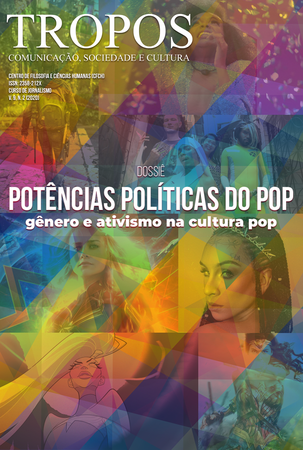TINTA BRUTA: A ARTE QUEER DO FRACASSO E A LUZ DOS VAGA-LUMES NO CINEMA
Keywords:
Queer; Cinema; Genre; Failure; Pop Culture.Abstract
The article presents a reflection on the film Tinta Bruta (2017), winner of the 2018 Teddy Award, the main LGBTQ cinematographic award, by Brazilian directors Filipe Matzembacher and Marcio Reolon, seeking to tension from this film the gender perspectives based on common places, into glorious stereotypes and objects of identification. We will also try to address how pop culture, historically linked to marketing, advertising, entertainment, in short, to artistic products aimed at the general public, can host discussions related to inadequate, unsuccessful, that is, those who trace their paths negatively out of curve of the triumphant premises of the cultural scene. It is in the dimension of the queer art of failure of a fag, designated by transgender author Jack Halberstam, that we identify the film Tinta Bruta, because, in addition to being genuinely a story of failure, the script takes the audience before the personal drama of the protagonist not to have a defeatist view of life due to the setbacks and misfortunes presented throughout the film. Tinta Bruta, like the firefly lights identified by Didi-Huberman in Pasolini's films, it takes us back to minimal existences that emanate an evanescent light of inventive possibilities, of the discovery of a political potency from the ways of life that they escape the capture of the logic of consumption and the dictates of success at any price.
Downloads
References
DIDI-HUBERMAN, G. Sobrevivência dos vaga-lumes. Tradução: Consuelo Salomé. Belo Horizente: Editora UFMG, 2011.
HALBERSTAM, J. A arte queer do fracasso. Tradução: Bhuvi Libanio; Prefácio Denilson Lopes. Recife: Cepe Editora, 2020.
LAPUJADE, D. As Existências Mínimas. Tradução: Hortencia Santos Lencastre.. São Paulo: N-1 edições, 2017.
MATZEMBACHER, F e REOLON, M. 'Tinta Bruta', o filme brasileiro que ganhou o principal prêmio do cinema LGBT do Mundo. Entrevista ao site huffpostbrasil.com. Disponível em: https://www.huffpostbrasil.com/2018/12/08/tinta-bruta-diretores-analisam-filme-que-ganhou-principal-premio-lgbt-do-mundo_a_23609499/. 12/08/2018. Acesso em 16/06/2020.
PASOLINI, P.P. Escritos Corsários. Tradução: Maria Betânia Amoroso. São Paulo: Editora 34, 2020.
PASOLINI, P. P. La sequenza del fiore di carta. Direção e Roteiro: Pier Paolo Pasolini. Fotografia: Giuseppe Ruzzolini. Elenco: Ninetto Davoli, Rochelle Barbieri. Ano de Produção: 1968. Cores. Disponível em https://www.youtube.com/watch?v=TIIMeu9oFIc. Acesso em 16/06/2020
VIDARTE, P. Ética bixa. Proclamações Libertárias para Militância LGBTQ. Tradução: Pablo Cardellino Soto e Maria Selenir Nunes do Santos. São Paulo: N-1 Edições, 2020.
Downloads
Published
How to Cite
Issue
Section
License
Transferência de direitos autorais:
Declaro que após aprovado para publicação a Revista Tropos editada pela Universidade Federal do Acre (UFAC), passará a ter os direitos autorais do trabalho, que se tornarão propriedade exclusiva da Revista, sendo permitida a reprodução total ou parcial desde que devidamente referenciada.

